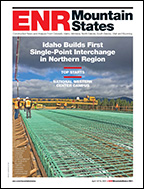After walking off a high-profile interchange project in Riverside, Calif., the general contractor returned to work March 3.
The general contractor, a joint venture of Washington Group International and Obayashi Corp., had stopped working Feb. 14 after reaching an impasse with the Calif. Dept. of Transportation about extra work and costs at the year-old project.
The two sides hammered out an agreement while work was at a standstill. "We have since signed a memo of understanding with CalTrans that resolves the differences we had," says Rod L. Hunt, spokesman for Boise-based Washington Group, the majority partner in the general contracting joint venture. "Our leaving the job won't have any impact on the project schedule. Those were bad weather days, and little work could have been done during that time."
Much of the dispute revolved around drainage, retaining walls and electrical work, which are often the last things outlined in detail in a design-sequencing scenario where work takes place as the project is still being designed, says CalTrans. But the plans have since been finalized and Washington-Obayashi is operating under a standard contract.
"We have worked with [the contractor] to identify changes in quantities and conditions," says Anne Mayer, director of CalTrans District 8. "We don't have a final estimate for the changes."
Washington-Obayashi's contract had originally been valued at $186-million. Neither side would say what increase was granted. The work is part of a $318-million upgrade of the intersection of Interstate 215, Highway 60 and Highway 91. The project includes two new freeway-to-freeway connectors, upgraded bridges south of the project, additional carpool lanes and a truck-climbing lane west of Moreno Valley on the grade near Interstate 215 and Highway 60. Completion is scheduled in 2007.
However, the working relationship between the contractor and the California Dept. of Transportation (CalTrans) started coming undone almost as soon as the contract was announced in February, 2004. Washington-Obayashi reportedly left $12 million on the table in submitting the winning bid based on 30% design.


Post a comment to this article
Report Abusive Comment